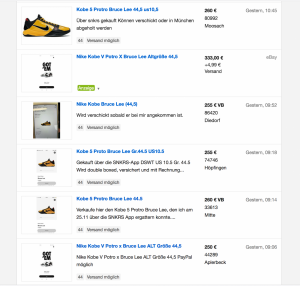Part of the reason Nike and other brands don't just price their products at $350 MSRP themselves is because they know that in the big picture, there just aren't enough people willing to pay that much over and over again for sneakers. The $150-above-retail reseller game only works in the longer term if the production volumes are low enough to match the number of hard-core consumers who are willing to consistently pay that stupid resale price.
You think so? I feel like it must be that they don't want the negative publicity from putting shoes out at a cost of $275 consistently, and other issues that arise when the market does what it does. Because otherwise, that's how capitalism and the markets are supposed to work. The price of a good should naturally settle at the price where there are steady sales. It's at what, $180 now, and the shoes instantly sell out. Like literally in 3 minutes nationwide. So if this was a generic company, on the next restock or release, the price should go up by whatever 'company x's market analysts think the market would bear. So the price goes up to $225, say. Would everybody still buy these at $225? You bet. Sells out nearly instantly still. Next restock/release, the price goes up to $280. Now, the product no longer sells out instantly, but would probably still sell out within an hour. People still take Ls though, and are upset they can't get the shoe. Price on next release goes up to $300. Now you've got a pretty good shot at getting the specific shoe you want if you're there at the release time.
Now with tax, you've got a shoe that anybody who has purchased it, has paid $330 or so. Is anybody regular playing in it? Probably not. The reseller market takes a big hit because with the fees, you've probably got to price the shoe at $400. So
1. The margins on each sale are smaller, as the upper bound of pricing should decrease to a narrow range above retail for the final price. Too high ($500+) and few are paying. Too low and there's no profit.
2. Hopefully fewer resellers have the capital in the first place to buy like 5 pairs and resell them. Right now if you did that, it's about a $950 investment (5 pairs). But if the price after tax is $330 per shoe, now it's a $1650 investment. Still possible, but hopefully more resellers would be locked out by that. And on top of that, the sneakerheads who really really want the shoe, who would be likely to pay that higher resale price, already got their pair since its possible now right at release time, so you're taking care of the demand that comes from the sneakerheads like us. So the reseller market will decline off of that too.
3. The more resale fails, the more that market dries up and the less people view that as an avenue to make money off of us.
But the downside is the publicity. It also hurts the company generally, because if you don't have $330 to spend for a shoe, that's it. You just don't have the money. People aren't clamoring over releases, and instead start to feel priced out of anything new, since all the new Jordan/Kobe/Lebron stuff will be $300, $310, $330 from jump. I mean those one Red/Blue Lebron 17s were $250 last year at release. Some pairs are still floating around, but they sold out a lot of sizes on NDC. But how many people would move to Adidas? Get some Dame 7s for $100. Get some Curry 8s for $150 or whatever.
There are a lot of considerations and this is only barely scratching the surface. I just think it's a lot more complex than (and I'm not saying you specifically said this) "make more pairs! it's that easy! but nike won't do it!".









































